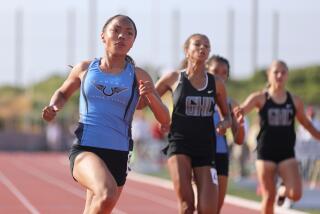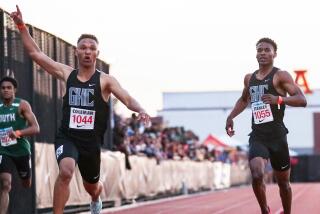Cutting to the Chase : Champion Miler Tubb Wonders if His Pursuit Was Worth It
- Share via
The place was Lombard, Ill., outside Chicago.
It was June, 1971.
Brent Tubb of Cleveland High won the 880-yard run and placed third in the mile in the International Prep Invitational, but as he fielded questions at a post-meet press conference he remembered why he had refused to speak to reporters during his junior and senior seasons. He was uncomfortable talking about himself or running.
So he got up and left the room.
If only all of life’s problems were so easy to deal with.
It’s been more than 24 years since Tubb won his second consecutive state title in the mile, yet he seems unsure if the sacrifices made in pursuit of those victories were worth it.
He takes pride in the fact that only seven athletes have won consecutive mile titles in the 77-year history of the State meet, but he also believes that, because of his dedication to running, he missed out on many of the things that life had to offer a teen-ager.
He is particularly fond of his 19-year-old son, Jessie, because of Jessie’s penchant for experiencing new things.
“Looking back, I think I gave up on a lot of things and that’s why I respect my son so much,” said Tubb, a service technician for a propane company outside Lake Tahoe. “I respect him a lot because he is such a well-rounded person and he has tried so many things in his life already. . . .
“He doesn’t have any fears. He’s not afraid to try new things. Actually, I’m sure he is, but he’s learned to overcome his fear of failure.”
Tubb had little experience with failure during his high school track career.
The seventh of nine children, he was part of a talented athletic family.
His father, Irvin, was Illinois state champion in the mile as a high school junior in 1935. His brother, Tim, won the 1967 Southern Section 3-A Division cross-country title for Camarillo High and another brother, Brian, was a 23-foot long jumper for Camarillo in 1969 before an injury ended his career.
Brent excelled in a variety of sports as a youngster and Tim still recalls the time that Brent defeated Tim Foli in a 50-yard dash.
Foli, who later starred at Notre Dame High and played for the New York Mets and other major league teams, was in eighth grade at the time and regarded as one of the fastest kids around, but fifth-grader Brent beat him handily in the 50.
“When Brent beat him, [Tim] just got furious,” Tim Tubb said. “He wanted to race him again and Brent beat him again, this time by more than he had the first time.”
Brent’s speed served him well as a sophomore at Camarillo, when he won the 1969 Southern Section 3-A title in the B Division 1,320 in 3 minutes 5.9 seconds.
Rules prohibited non-varsity runners from contesting races longer than three laps of a 440-yard track in those days, but Brent easily made the transition to the mile as a junior at Cleveland.
Tubb moved into the Cleveland attendance district in the summer of 1969 because his father’s job as an aerospace engineer had the family constantly on the move in the then-robust Southern California job market.
Tubb defeated Rich Tschudin of Palisades for the City Section and state titles in 1970. He ran 4:16.9 to Tschudin’s 4:17.6 in the City meet and timed 4:12.9 to Tschudin’s 4:14.0 in the State final while wearing a pair of shoes borrowed from his rival.
Described as a “dreamer” by his mother, Leah, and as a “bit of a space cadet” by Tim, Brent forgot to pack his track spikes for the competition at Berkeley’s Edwards Stadium. Tschudin, Tubb’s assigned roommate, loaned him a pair of shoes.
“I always thought that was a really nice gesture on his part,” Tubb said. “I’d never talked to him much before then, but we became pretty good friends after that.”
Tubb lowered his best time to 4:09.2 in a summer all-comers’ meet after his victory in the State championships.
His exploits made him a big man on campus when school started in the fall, but it was a role he disdained. He was so uncomfortable with it his friends began introducing him to people as Wendell Mottley.
Mottley was a Trinidadian sprinter who won a silver medal in the 400 in the 1964 Olympic Games, but the painfully shy Tubb liked going by that alias because he hated being treated as “Brent Tubb, track star.”
“I don’t understand why people treat you differently because you happen to be a good athlete,” Tubb said. “To me, I was just a runner. But everyone wanted to make a big deal out of it. I never understood that.”
Tubb’s notoriety only increased during his senior season. He ran 1:50.1 in the 880 and won his second consecutive mile titles in the City and State championships.
His victory in the State meet was particularly memorable because he trailed Paul Cummings of Righetti by 10 yards with 220 left before posting a 4:09.6 to win.
“I had heard going into the race that [Tubb] could run a 47-second [440],” Cummings said. “I had run a 50 so I figured I needed to have about 20 yards on him with 220 to go. I had 10 and lost by 10 so my original assessment was correct. He passed me with about 90 yards to go and there was nothing I could do about it. . . .
“He had a very nice fluid stride and when he decided to go, he was gone.”
The athletic careers of Tubb and Cummings took divergent paths after that.
Cummings became one of the most versatile runners in U.S. history--recording bests of 3:37.6 in the 1,500 meters, 13:19.62 in the 5,000, 27:43.7 in the 10,000 and 2:11:31 in the marathon--but Tubb never improved on his high school marks.
Lacking the grades to attend an NCAA Division I school, Tubb was a redshirt at Moorpark College during the 1971-72 school year before running cross-country and track for Pierce during the 1972-73 seasons.
He didn’t produce any great marks for the Brahmas but ran well enough to earn a scholarship to the University of Arizona.
*
A series of injuries effectively ended his career in 1974, however, after he strained his left hamstring during a meet at UCLA and injured it twice more playing basketball and baseball.
He withdrew from Arizona shortly thereafter for a variety of reasons, one of which was the Wildcat coaching staff’s understandable displeasure with a scholarship athlete suffering two hamstring injuries while playing other sports.
“They had a lot of problems with me so I just left,” Tubb said. “They didn’t take kindly to scholarship athletes playing other sports during the season, especially when they kept getting hurt.”
Tubb returned to Camarillo for about a year before moving to Meyers, Calif., near Lake Tahoe. He met his wife, Linda, there and they were married in 1976. Jessie was born later that year.
Jessie, who is attending Cal State Stanislaus on a music scholarship, never displayed the affinity for sports that Brent did, but his dad seems relieved by that.
Brent said he never felt pressured to excel in sports as a child, but running was the biggest thing in his life when he graduated from high school and the Olympics were his ultimate goal.
His failure to reach that level bothered him for several years, although he has now come to grips with that part of his life.
“It took a long time for me to adjust to not being able to run because I never got to the level where I thought I should have,” he said. “I never ran up to my potential. . . .
“I went through a lot of years wondering why it happened. It took me several years before I could watch a track meet. I just didn’t feel comfortable about the way things had turned out for a long time.”
More to Read
Go beyond the scoreboard
Get the latest on L.A.'s teams in the daily Sports Report newsletter.
You may occasionally receive promotional content from the Los Angeles Times.










